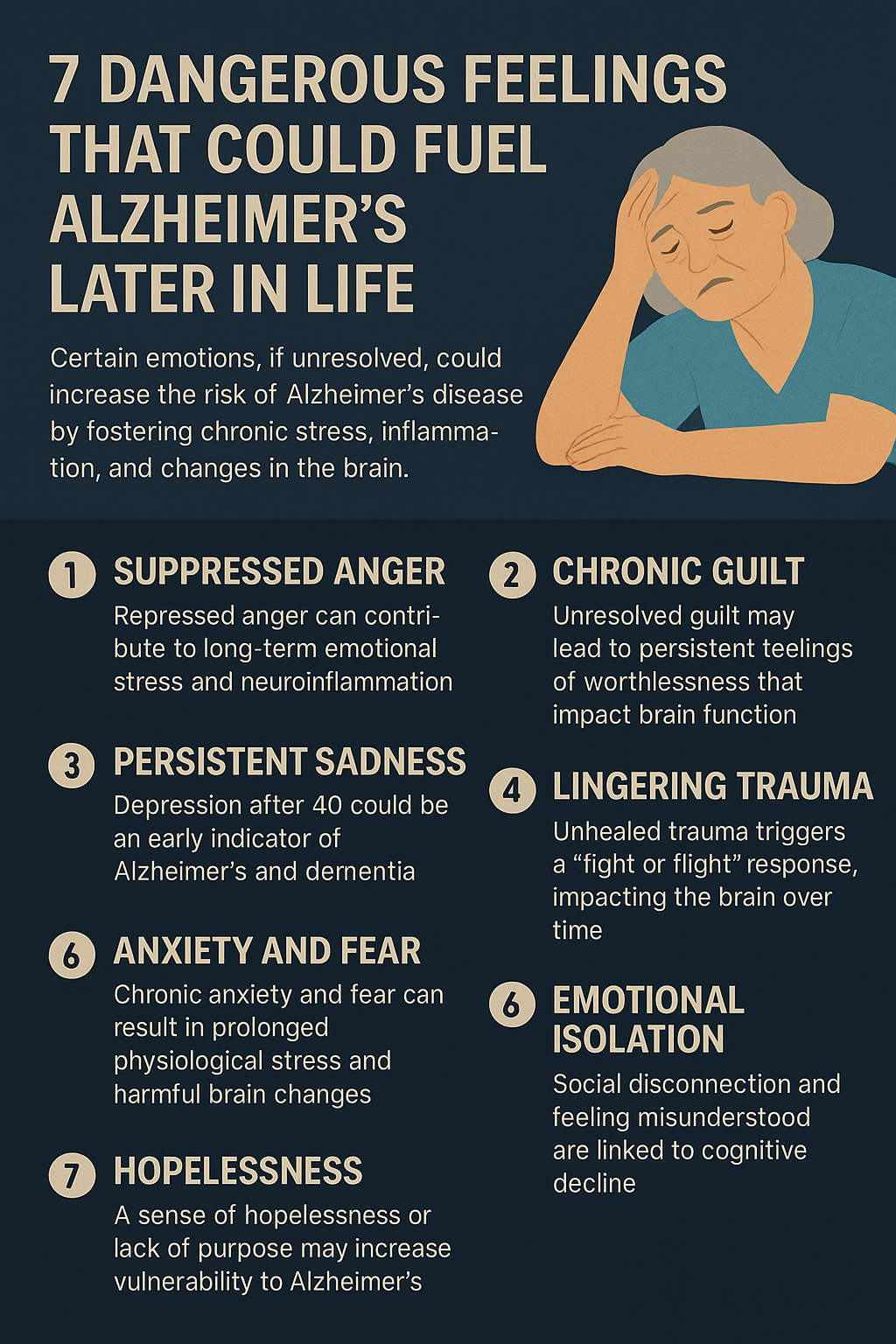
Alzheimer Emergence: 7 Dangerous Feelings That Could Fuel Alzheimer Later in Life
Introduction: The Hidden Link Between Emotions and Alzheimer’s
When we talk about Alzheimer’s disease, we often focus on age, genetics, and biological degeneration. However, recent studies and growing psychological insight suggest that the feelings we carry—especially those we never resolve—could quietly set the stage for Alzheimer’s. Depression, anxiety, and chronic emotional stress may be more than just symptoms; they might be warning signs.
1. Suppressed Anger: The Emotional Time Bomb
Chronic anger that’s never acknowledged or processed doesn’t just harm relationships—it also impacts the brain. When suppressed over time, it can contribute to neuroinflammation, a known factor in Alzheimer’s development. Emotional regulation and expressing anger healthily can be key to long-term brain health.
2. Persistent Guilt: The Unseen Burden
Carrying unresolved guilt, especially from early life experiences, can lead to long-term emotional dysregulation. The stress associated with guilt has been linked to elevated cortisol levels and disrupted brain plasticity—both contributing factors to Alzheimer’s disease. Therapy, forgiveness work, and self-compassion can provide essential relief.
3. Chronic Sadness and Depression: A Precursor to Cognitive Decline
A Japanese study, recently published in Alzheimer’s & Dementia: The Journal of the Alzheimer’s Association, found that mood disorders such as depression and bipolar disorder after the age of 40 could signal early stages of neurodegenerative conditions. These disorders are not merely emotional experiences but possible indicators of deeper brain changes.
4. Lingering Trauma: When the Past Refuses to Stay Past
Trauma isn’t always loud or obvious. Even micro-traumas—like emotional neglect or repeated invalidation—can quietly wreak havoc on the nervous system. PTSD and complex trauma are increasingly recognized for their roles in altering brain structures like the hippocampus and amygdala, which are crucial in Alzheimer’s progression.
5. Anxiety and Fear: The Brain Under Siege
Long-term anxiety keeps the body in a state of alert, flooding it with stress hormones. Over decades, this physiological stress can wear down brain regions associated with memory and executive function. Alzheimer’s researchers now consider anxiety a possible early indicator, not just a coexisting symptom.
6. Emotional Isolation: The Invisible Killer
Feeling emotionally disconnected or lacking meaningful relationships can have effects comparable to smoking or obesity. Emotional loneliness has been strongly linked with cognitive decline. People who live alone or feel misunderstood over many years are at increased risk of developing Alzheimer’s.
7. Hopelessness: When the Mind Gives Up
A persistent lack of purpose or hope for the future is more than just a mindset—it’s a mental health risk. Studies suggest that hopelessness in midlife can predict a higher likelihood of Alzheimer’s decades later. Purpose, meaning, and mental engagement can serve as neuroprotective tools.
Teen Innovation: Hope Amid the Risk
In a heartwarming and futuristic twist, 17-year-old Hemesh Chadalavada has developed the ‘Alpha Monitor,’ a device that helps caregivers track Alzheimer’s patients. Inspired by a personal incident involving his grandmother, this tool can detect when a patient wanders off or falls, making caregiving safer and smarter. While emotional health addresses the root causes, tech like this supports day-to-day management.
Prevention: Rewriting Emotional Histories
Though Alzheimer’s cannot yet be cured, early intervention through emotional healing might reduce risk:
- Therapy and Counseling: Address repressed emotions before they solidify into chronic mental states.
- Mindfulness & Meditation: Reduce stress and increase emotional resilience.
- Social Bonds: Build and nurture strong, emotionally fulfilling relationships.
- Neuroplasticity Exercises: Keep the brain engaged through learning and creativity.
- Early Screening: If you notice prolonged emotional distress post-40, consider a neuropsychological evaluation.
Conclusion: It’s Time to Take Feelings Seriously
Alzheimer’s may not be caused solely by emotional baggage, but the evidence strongly suggests that unresolved feelings can play a key role. Depression, guilt, trauma, and isolation aren’t just mental health concerns—they might be the early echoes of something more serious. The good news? You have the power to intervene today.
Don’t wait until cognitive symptoms appear. Emotional wellness isn’t just good for the heart—it may be vital for the brain.

Unresolved Grief – Suppressed mourning burdens emotional circuits.
Isolation – Lack of connection speeds cognitive decline.
Guilt – Persistent guilt fuels negative neural patterns.
Chronic Stress – Ongoing stress raises cortisol, shrinking the hippocampus.
Hopelessness – A lack of purpose may impair brain resilience.
Emotional Numbness – Detachment from feelings can dull neural activity.
